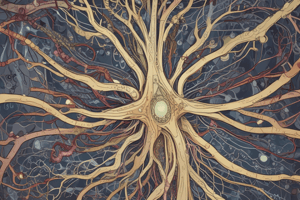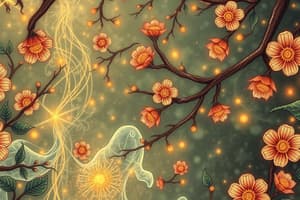Podcast
Questions and Answers
Flashcards
Excitatory Neurotransmitters
Excitatory Neurotransmitters
Chemicals that promote neural firing by depolarizing the postsynaptic neuron.
Inhibitory Neurotransmitters
Inhibitory Neurotransmitters
Chemicals that prevent neural firing by hyperpolarizing the postsynaptic neuron.
Dopamine
Dopamine
A neurotransmitter involved in reward, motivation, and movement. Dysregulation is linked to Parkinson's disease and schizophrenia.
Serotonin
Serotonin
Signup and view all the flashcards
Norepinephrine
Norepinephrine
Signup and view all the flashcards
Glutamate
Glutamate
Signup and view all the flashcards
GABA (Gamma-Aminobutyric Acid)
GABA (Gamma-Aminobutyric Acid)
Signup and view all the flashcards
Hormones
Hormones
Signup and view all the flashcards
What are endorphins?
What are endorphins?
Signup and view all the flashcards
What does Substance P do?
What does Substance P do?
Signup and view all the flashcards
What is acetylcholine involved in?
What is acetylcholine involved in?
Signup and view all the flashcards
What is adrenaline?
What is adrenaline?
Signup and view all the flashcards
What does leptin do?
What does leptin do?
Signup and view all the flashcards
What does Ghrelin do?
What does Ghrelin do?
Signup and view all the flashcards
What is melatonin?
What is melatonin?
Signup and view all the flashcards
What is oxytocin known for?
What is oxytocin known for?
Signup and view all the flashcards
Study Notes
Neurotransmitters and Hormones
- Neurotransmitters: Chemical messengers within the nervous system.
- Excitatory Neurotransmitters: Promote neural firing by depolarizing the postsynaptic neuron.
- Inhibitory Neurotransmitters: Prevent neural firing by hyperpolarizing the postsynaptic neuron.
- Dopamine: Involved in reward, motivation, movement; dysregulation linked to Parkinson's and schizophrenia.
- Serotonin: Regulates mood, sleep, appetite, and digestion; low levels associated with depression.
- Norepinephrine: Involved in arousal, alertness, and the fight-or-flight response.
- Glutamate: Primary excitatory neurotransmitter, crucial for learning and memory.
- GABA (Gamma-Aminobutyric Acid): Main inhibitory neurotransmitter, reducing neural excitability.
- Endorphins: Reduce pain perception, promote well-being and pleasure.
- Substance P: Involved in pain signal transmission.
- Acetylcholine: Involved in muscle action, learning, and memory.
Hormones
- Hormones: Chemical messengers produced by glands, regulating body functions and behaviors.
- Adrenaline (Epinephrine): Involved in the fight-or-flight response, increasing heart rate and energy.
- Leptin: Regulates energy balance by inhibiting hunger.
- Ghrelin: Stimulates hunger and promotes food intake.
- Melatonin: Regulates the sleep-wake cycle.
- Oxytocin: Involved in bonding, social interactions, and childbirth.
Psychoactive Drugs
- Psychoactive Drugs: Substances altering perception, mood, or consciousness by affecting the nervous system.
- Agonists: Enhance neurotransmitter effects by stimulating receptors.
- Antagonists: Block neurotransmitter effects by inhibiting receptors.
- Reuptake Inhibitors: Prevent neurotransmitter reabsorption, increasing synaptic availability.
- Stimulants: Increase neural activity, leading to heightened alertness and energy (e.g., caffeine, cocaine).
- Caffeine: Blocks adenosine receptors, increasing alertness.
- Cocaine: Increases dopamine, norepinephrine, and serotonin release, leading to euphoria and energy.
- Depressants: Decrease neural activity, leading to relaxation and sedation (e.g., alcohol, benzodiazepines).
- Alcohol: Slows neural processing, impairs judgment, coordination, and memory.
- Hallucinogens: Distort sensory perception, induce hallucinations (e.g., LSD, psilocybin).
- Marijuana: Induces euphoria, altered perception, often affecting short-term memory and motor coordination.
- Opioids: Bind to opioid receptors for pain relief and euphoria (e.g., heroin, morphine).
- Heroin: Intense euphoria, highly addictive.
Drug Effects and Dependence
- Tolerance: Increasing drug amounts needed for same effect due to reduced sensitivity.
- Addiction: Compulsive drug use, loss of control over consumption.
- Withdrawal: Physical and psychological symptoms from stopping/reducing drug use.
Studying That Suits You
Use AI to generate personalized quizzes and flashcards to suit your learning preferences.
Description
Test your understanding of neurotransmitters and hormones with this quiz. Explore the roles of various neurotransmitters, including dopamine, serotonin, and GABA, and their impact on mood, learning, and pain perception. Challenge your knowledge on how these chemical messengers influence the nervous system.




